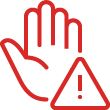 Fraudulent Calls Reported
Fraudulent Calls Reported
We’ve seen a rise in scam calls falsely claiming to be from the KEMBA Fraud Department. If you receive one, hang up immediately and contact us directly at 800.282.6420, option 4.
We will never call, text, or email you to request your personal or account information such as Digital Banking usernames, passwords, or 2-Factor Authentication (2FA) codes, or identifying information (account or card numbers, expiration dates, CVV code, or PIN).
 Watch Out for Crypto ATM Scams
Watch Out for Crypto ATM Scams
Be Vigilant: Scammers may impersonate trusted companies and direct the victims to “secure” their assets or make payments using virtual currency kiosks, also known as crypto ATMs.
Protect Yourself:
- Never rely on caller ID when receiving a call from someone claiming to be a KEMBA Financial Credit Union employee – or any business.
- If something feels off, hang up immediately and call the company directly using a verified phone number.
- Be cautious of anyone urging you to make payments via any money terminal or Bitcoin kiosk.
 Phishing Text Message Alert
Phishing Text Message Alert
Please be aware of phishing text messages requesting you to click on a link to verify or view a transaction. KEMBA will never put a link in a text message for transaction verification. If you receive a text message with a link embedded in the message, call 1.888.918.7313 to report it.
 Beware of Quishing Scams
Beware of Quishing Scams
"Quishing," short for QR code phishing, is a scam using QR codes to commit identity fraud. Scammers place fraudulent QR codes in high-traffic areas or send them via email or text message. Before scanning a QR code, ask yourself: Where did this come from? Who posted or sent this?
Do not scan a QR code if you notice that it appears tampered with, replaced, or covered up with a fraudulent version. If you receive an unexpected email or text with a QR code, don’t scan it, especially if it urges you to act immediately. Contact the financial institution, government agency, or business that the scam artist is impersonating so they can alert others and work with law enforcement to investigate the activity.
 Apple Device Attack
Apple Device Attack
Apple users are receiving fake, system-level messages on their iPhones, Apple watches and MacBooks, to reset their passwords. In cases when this scam has not been successful, fraudsters are calling users of these devices and requesting them share their Apple ID credentials over the phone. This is a reminder to never share your Apple ID password or any other personal information to someone you do not know.
If you receive a call asking for your Apple ID password or personal information, hang up immediately and call the Apple Support number to report the call and to confirm if the call was valid.
 Scam Alert
Scam Alert
This is a reminder that KEMBA will not call or text you to request personal information; including, but not limited to:
- Digital Banking Log-in and/or Passwords
- Account Numbers
- Card Information
- Other Personal Identifying Information
Please remain alert and do not provide this sensitive information. If you receive a call asking for your personal information, hang up immediately and call the number on the back of your card to report the call and to confirm if the call was valid.
 Fraudulent Calls Reported
Fraudulent Calls Reported Watch Out for Crypto ATM Scams
Watch Out for Crypto ATM Scams Phishing Text Message Alert
Phishing Text Message Alert Beware of Quishing Scams
Beware of Quishing Scams Apple Device Attack
Apple Device Attack Scam Alert
Scam Alert


